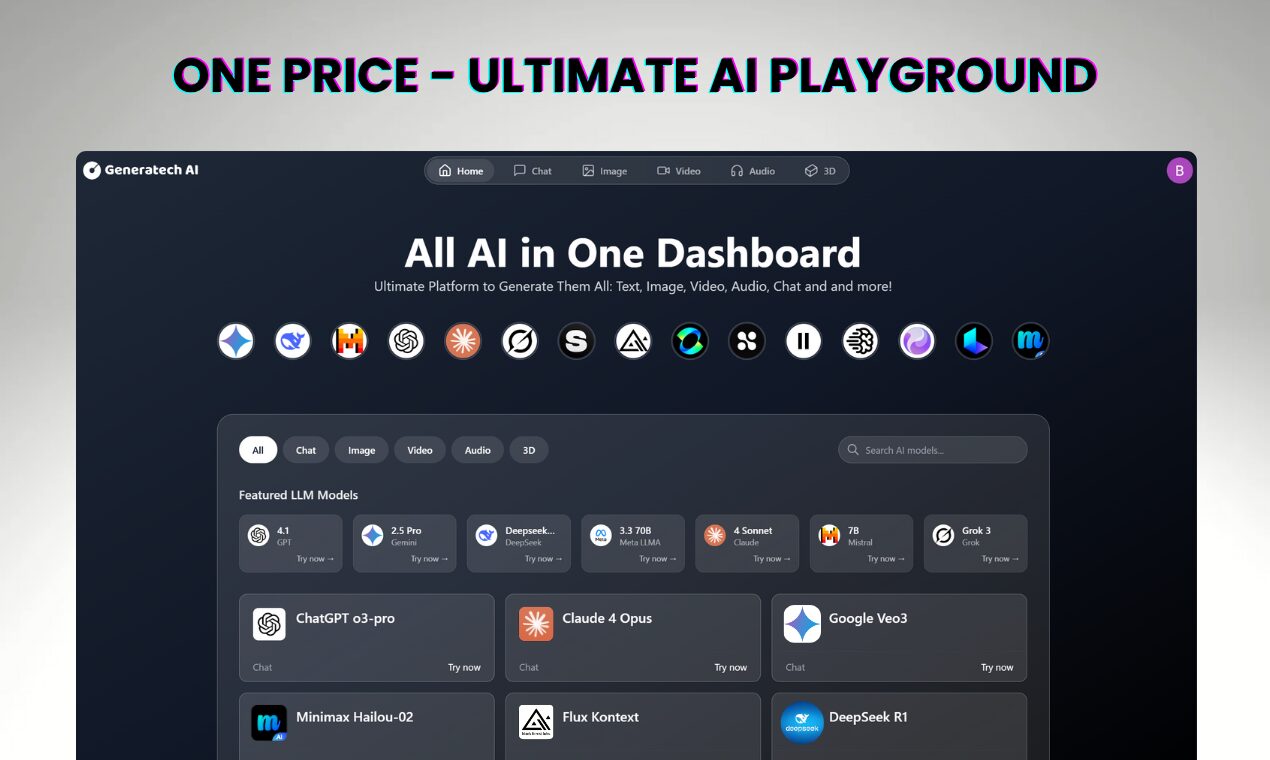Table of Contents
Overview
Generatech AI represents a comprehensive AI platform aggregator in the rapidly evolving artificial intelligence landscape, where managing multiple AI subscriptions and accessing diverse models can become complex and costly. As a unified AI platform, Generatech AI provides streamlined access to multiple AI models from leading providers including OpenAI, Anthropic, Google, and others through a single subscription model priced at \$14/month or \$140/year.
Key Features
Generatech AI delivers capabilities designed to streamline AI workflow management:
- Multi-Model Access: Access to chat models (GPT-4.1, Claude 4 Sonnet, Gemini 2.5 Pro), image generation tools (DALL·E, Stable Diffusion, Flux), video creation models (Kling, Luma Dream Machine), audio processing tools, and 3D modeling capabilities
- Unified Interface: Clean, intuitive dashboard design enabling rapid model discovery and experimentation
- Consolidated Billing: Single subscription eliminates individual platform fees while providing transparent usage tracking
- Regular Updates: Platform integrates newly released AI models as they become available
How It Works
Generatech AI operates through a credit-based system that simplifies multi-model access. Users subscribe to gain immediate access to a centralized dashboard that aggregates AI models from various providers. The platform’s unified interface allows seamless switching between different model types and providers without requiring separate API keys or individual account management.
Use Cases
The platform serves diverse professional applications:
- Content Creation Teams: Leverage integrated text, image, video, and audio generation for multimedia campaigns
- Developer Workflows: Access multiple models for code generation and development without managing separate integrations
- Small Business Operations: Compare model outputs for various business applications
- Educational and Research: Experiment with different AI capabilities for learning and development
Pros \& Cons
Advantages
- Simplified Access: Single subscription for multiple AI model categories
- Cost Efficiency: Potential savings compared to multiple individual subscriptions for moderate users
- Reduced Complexity: Eliminates need to manage multiple AI tool accounts
- Model Variety: Access to both established and emerging AI models
Disadvantages
- Subscription Dependency: Requires ongoing monthly payment regardless of usage patterns
- Limited Advanced Features: May lack deep customization available through native provider interfaces
- Credit System: Usage tracking required to prevent service interruptions
- Performance Variables: Additional routing may introduce latency compared to direct provider access
How Does It Compare?
The AI aggregation landscape has evolved significantly, with multiple platforms now competing in this space. Hugging Face continues to lead in open-source model hosting and community-driven development, offering extensive free access to models and datasets primarily for developers and researchers. However, it focuses more on model hosting than unified commercial access.
OpenRouter remains a prominent competitor, providing API-level access to over 300 models with sophisticated routing capabilities and a 5% fee structure for unified billing. OpenRouter excels in developer-focused implementations and offers more granular control over model selection and routing logic.
Emerging competitors include Eden AI, which offers both unified API access and custom AI development services; Ninja AI, with 25+ model access and unlimited usage plans; and specialized platforms like 1min.AI targeting specific use cases with lifetime subscription models. DeepSeek R1, which gained significant attention in early 2025, represents a new category of open-source reasoning models that can be run locally, providing an alternative approach to centralized AI access platforms.
Key differentiators: Generatech AI positions itself between technical complexity and user accessibility, offering more models than basic aggregators while maintaining simpler implementation than developer-focused platforms. Unlike purely API-based solutions, it provides a complete dashboard experience with visual model interaction alongside programmatic access.
Market positioning: The platform competes primarily on breadth of access, user experience design, and integrated billing simplicity rather than lowest cost or maximum technical flexibility.
Expert Insights and Industry Context
The AI aggregation market reflects broader trends toward platform consolidation and simplified access patterns. Industry analysis indicates growing demand for unified AI platforms among organizations seeking to reduce vendor management complexity.
Current market dynamics show varying pricing strategies across providers, with OpenAI’s ChatGPT Pro at \$200/month targeting heavy users, Anthropic’s Claude Max offering \$100–\$200/month tiers, and Google’s Gemini Advanced at \$20/month for basic access. This pricing diversity creates opportunities for aggregation platforms to provide value through simplified access models.
Implementation considerations: Organizations implementing AI aggregation platforms typically focus on workflow integration, usage monitoring, and cost management rather than maximum performance optimization for specific tasks.
Final Thoughts
Generatech AI addresses growing complexity in AI tool management through comprehensive model access and streamlined user experience. While the platform may not offer the deep customization of native provider interfaces or the technical control of developer-focused platforms, its value proposition centers on operational simplicity and broad capability access.
For users seeking simplified AI tool management, diverse model experimentation, and consolidated billing, Generatech AI provides a practical solution. For developers requiring maximum technical control or specialized deployment options, direct provider relationships or more technical platforms may better serve specific requirements. The platform represents the maturation of AI aggregation services, offering accessible features while maintaining functionality for users exploring AI capabilities across multiple domains.
